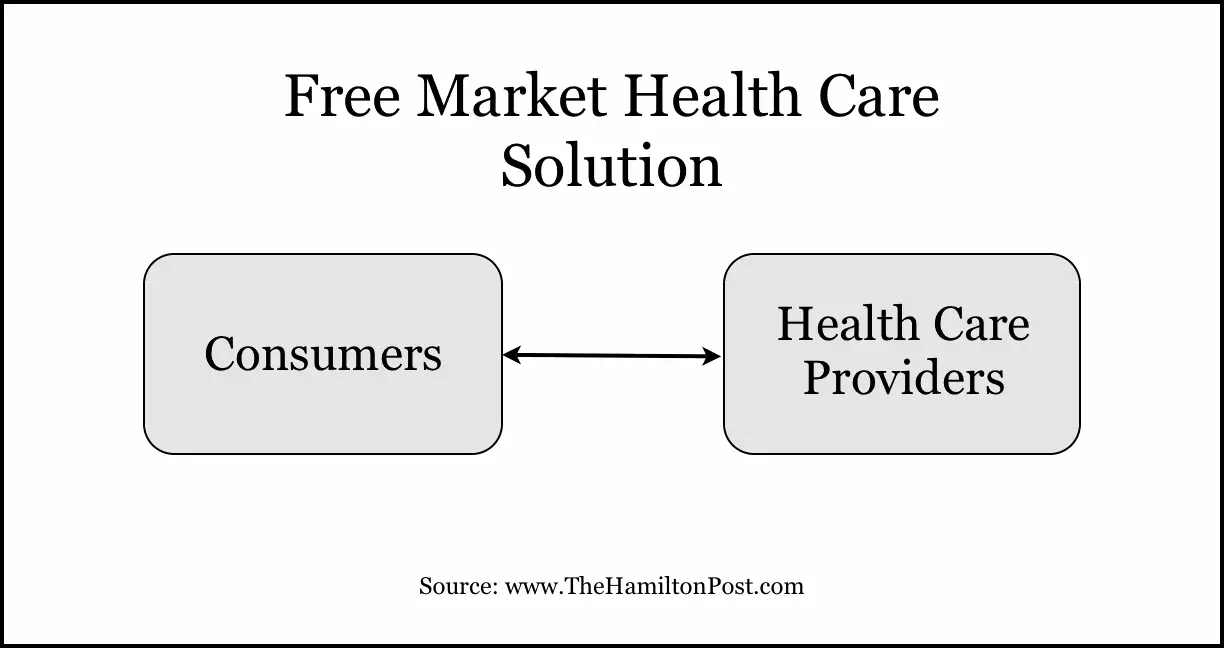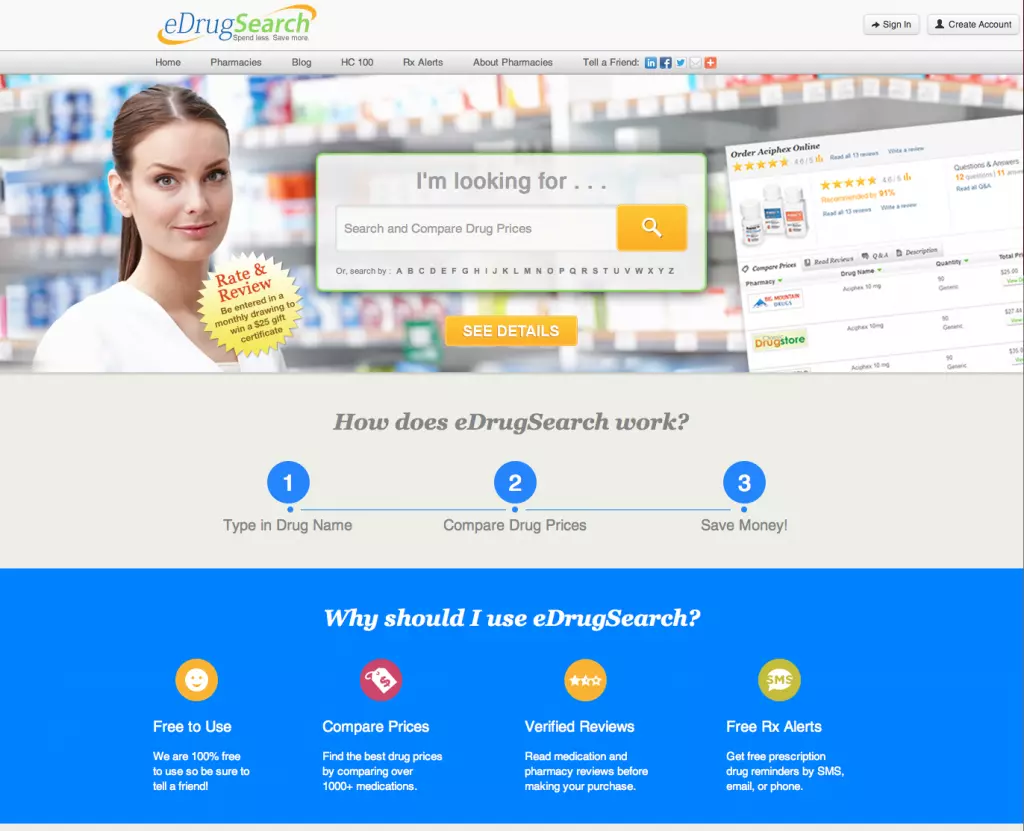Why Should I Order My Medication Online?
Going to a pharmacist in person for your medication can be time consuming and difficult, especially if you suffer from any physical ailments or if you are seriously ill and stuck in bed. Fortunately, there are licensed online pharmacies that can deliver your medication right to your door. Learning how to order medication online may seem tricky at first, but it is actually much quicker and easier than driving to a pharmacy in person. Aside from saving you the hassle of driving to the pharmacy, ordering your medication online is also cheaper; 50-80% cheaper than U.S. retail prices. Online pharmacies do not have the overhead of brick and mortar stores so they can offer the same medicine at a lower price.
How to Order Medication Online: Getting Started
When you want to know how to order medication online, the best place to start is eDrugSearch.com. eDrugSearch is a website that allows you to search for the medication that you need, then it compares the prices for all your prescription drugs at all of the top rated online Canadian pharmacies in order to find you the best deals. The great thing about using the site eDrugSearch to find your online pharmacy is that the site utilizes a rigorous screening process for all of the pharmacies listed and verified user reviews, so you never have to worry about who you are ordering your medication from. It is just as safe as going to your local neighborhood pharmacist.
How Do I Order My Medication?
Once you have found the medicine that you need through eDrugSearch at the price that fits your budget then you are ready to place your order. Even though you are ordering medication online, if the drug that you are ordering requires a prescription then you will still need to provide the online pharmacy proof of your prescription. Most online pharmacies will try to make this as easy as possible for you and allow patients to mail, fax or sometimes even e-mail them your prescription. Do not try to order controlled substances or drugs classified as scheduled. It is also a good idea to limit your orders to a three month supply or less. Following these guidelines will help to ensure that your order does not get delayed and to prevent incurring any penalties.
How to Order Medication Online from an International Pharmacy
If you choose to order your medication from an international pharmacy then you should follow these guidelines and tips in order to stay safe. Every country has somewhat different codes that they must follow when producing medication, so you want to make sure that the pharmacy you are ordering from follows good health practices.
Here are some things to look out for:
- An agency equal to the FDA that monitors all drugs produced to ensure they are safe for consumption.
- National laws and standards regarding labeling medication.
- National laws requiring a prescription for certain medications.
- Laws requiring that pharmacies follow specific guidelines regarding handling and dispensing drugs.
- The country should also follow Good Manufacturing Practices when creating pharmaceuticals.
Ordering online from international pharmacies may help patients without insurance save some money, but ordering domestically within the United States has many benefits. These benefits include cheaper generic drugs and more affordable shipping rates. There is also the added benefit and peace of mind that the Food and Drug Administration regulate the United States pharmaceutical drug supply. The FDA holds clinical trials to ensure the safety of any drug made available in the United States and they also issue recalls whenever new information comes out concerning a potentially unsafe drug.
About this Angie’s List Expert: Cary Byrd is the president and founder of eDrugSearch.com. Based in San Antonio, eDrugSearch.com is a free cost comparison engine that helps consumers get safe access to affordable medications and advocates licensed online pharmacies as a widely accepted alternative.
Save money on popular meds as they go generic in 2010

We’re nearing the end of the year, and many people are already in open enrollment for next year’s health coverage, which means it is a great time to plan ahead for your 2010 drug expenditures. No, you can’t know every medication you are going to need, but if you are on a popular, patented maintenance drug such as Lipitor or Cozaar, you’ll be pleased to hear that their patents are expiring in 2010, opening the field for more-affordable U.S. generic versions.
In the meantime, as you do your research, you will see that many are already available as generics, manufactured outside of the U.S. There is usually a considerable cost savings.
Here are all the details of some of the highest-profile drugs that have expiring patents as of the end of 2009, or during 2010 — and how and where to get the generic versions.
ARICEPT (donepezil). Pfizer makes the acetylcholinesterase inhibitor Aricept for the treatment of Alzheimer’s disease. Aricept is scheduled to lose patent protection in the U.S. in 2010, but generic versions are already available.
COZAAR (losartan). Merck’s Cozaar is an angiotensin II receptor antagonist, used to treat hypertension. Cozaar’s patent protection in the U.S. will expire in 2010. In the meantime, generic losartan is available here.
LEVAQUIN (levofloxacin). Johnson & Johnson’s antibiotic drug Levaquin will outlive its patent protection in 2010. However, until that time, you can purchase generic levofloxacin here.
LIPITOR (atorvastatin). Pfizer has the best-selling drug in the world in Lipitor, which treats high cholesterol. In the US, the basic patent for Lipitor expires in March 2010, while the second patent covering the calcium salt of atorvastatin expires in June 2011. It is not yet clear exactly which date will see widespread availability of generic Lipitor in the U.S., but it is coming. In the meantime, generic atorvastatin is available here.
XENICAL (orlistat). Roche’s Xenical is an obesity treatment that prevents the digestive system from absorbing fats. Its patent expires in December of this year. (Note: In some countries, including the U.S., orlistat is available over-the-counter as GlaxoSmithKline’s Alli.)
VALTREX (valacyclovir). GlaxoSmithKline’s Valtrex is a treatment for herpes simplex and herpes zoster (shingles). Valacyclovir was recently approved for generic production, and so generic versions will be on the U.S. market by the end of 2009. As of this writing, generic valacyclovir is available here.
If you’re interested in the business ramifications for the pharmaceutical companies, CNN ran a good article on the topic, and so did Chemistry World.
Enjoy using EDrugSearch.com to knowledgeably plan your medication choices for the coming year.
 I received the following message the other day from one of our blog’s readers, Susanna Brooks:
I received the following message the other day from one of our blog’s readers, Susanna Brooks:
I cannot believe that I cannot buy drugs in Canada (with a prescription). It’s been the only way that I can get some of the medications that I need that are ungodly expensive in the United States. I will work to vote against any Senator/Congressman that votes against the Canadian medications being sold/deliver in the U.S.A.!!
Sharing Susanna’s Sentiments
I know for a fact that tens of millions of people share Susanna’s sentiments. Surveys show that up to 80 percent of Americans agree that we should be able to buy prescription drugs from licensed Canadian pharmacies. So why aren’t the American people (officially, at least) allowed to do so?
As readers of this blog know, we’ve been covering the progress of proposed legislation on drug reimportation — allowing Americans to buy drugs from Canada — for some time now. The issue first bubbled to the surface in the late 90s, as the Internet made it easy for Americans to access Canadian pharmacies, enabling them to buy drugs for up to 80 percent less than at domestic drugstores.
Drug companies have tried everything to prevent this kind of free trade from happening. They’ve threatened to cut off supplies to Canadian drugstores that sold to Americans. They’ve tried to link Canadian drugstores to terrorism. And currently, they’re spending a lot of money with the National Association of Boards of Pharmacy and other “independent” groups to spread lies about the safety of licensed Canadian pharmacies.
But ultimately, Big Pharma’s most effective weapons against American consumers have been our own representatives in Congress and the White House. Thanks to the more than $1 billion that Big Pharma has paid out in Washington in the past decade, these politicians are really not our representatives at all. They’re Big Pharma’s representatives.
Surely, it’s been a tricky proposition for the politicians — opposing something that the American people overwhelmingly support. And how they’ve handled it over the past decade has been a dishonest, double-dealing mess.
How It All Started
Let’s take a look back:
It all started with “Slick Willie” — Bill Clinton. Both Clinton and his Republican Congress knew that Americans wanted legal reimportation. But they worked together (thanks to bags of money from Big Pharma) to give us a classic bait and switch.
Clinton, who publicly stated his support for reimportation, signed the Medicine Equity and Drug Safety Act into law on October 28, 2000, which supposedly made it legal. But the law contained huge loopholes that rendered it meaningless. One of these was to require Health and Human Services Secretary Donna Shalala to certify that the law would “pose no additional risk to public health and safety” and “significantly lower the cost of prescription drugs.” Shalala refused to do this, and the law became moot.
Then Bush won the 2000 election. Bush, like Clinton, was an avowed supporter of reimportation — at least during the campaign. He said reimportation “makes sense†as a way to provide a “helping hand†to the elderly.
After the election, Bush withdrew that helping hand, going silent on the issue. Members of Congress, spurred on by angry constituents, re-introduced reimportation legislation and, once again, it passed both houses of Congress. But again, it died.
In 2008, both Obama and McCain were vocal supporters of reimportation. Obama presented it as a main plank in his healthcare plan.
In anticipation of the new president’s support, bills to allow Americans to buy prescription drugs from Canada were introduced in both the House and the Senate this spring. But now it looks like this proposed legislation will not even be brought to a vote.
Obama’s Backroom Deal
Why? Because Obama cut a backroom deal with Big Pharma, agreeing not to support reimportation if the pharmaceutical industry agreed not to fight Obama’s other planned health reforms.
And that’s the sad, sordid history of how a public policy that in the past 10 years has been supported (during campaigns) by:
- Bill Clinton;
- Al Gore;
- George W. Bush;
- John Kerry;
- John McCain; and
- Barack Obama
has still not become law in the United States.
Can you think of a single other policy that every president or party candidate for an entire decade has supported — and yet, somehow, has never become law?
I can’t.
As a reader of this blog, I’m guessing you may agree with the sentiments of our frustrated reader, Susanna Brooks. But my question is, how many of you care enough about this issue to do something about it?
Are you willing to write the FDA? Call your Congressman? Send a letter to the White House?
If so, now is the time to do it. Because once healthcare legislation is passed (in all likelihood) in the fall, drug reimportation could be a forgotten issue for years to come.
Source
 We’re written before about U.S. Senator David Vitter’s quixotic fight to legalize the purchase of Canadian drugs by Americans — long after the battle over reimportation has been lost in a thick haze of Big Pharma backroom bargaining with the White House.
We’re written before about U.S. Senator David Vitter’s quixotic fight to legalize the purchase of Canadian drugs by Americans — long after the battle over reimportation has been lost in a thick haze of Big Pharma backroom bargaining with the White House.
Last week, Vitter — a Republican — took some heat from liberals by explaining at a town hall meeting that he hoped to de-stabilize pricing in Canada and other countries with “socialized medicine” by legalizing reimportation.
The Daily Kos ripped Vitter, saying:
His reason for supporting re-importation is solely predicated on the notion that if enough Americans partake, it might wreck Canada’s system … Despite the lack of plausibility in his “logic”, Vitter now claims the clubhouse lead for worst rationale for a policy position ever.
No, not exactly.
What Vitter is really talking about is using the global free market to rationalize prices worldwide. And to that I say, Amen!
As Vitter explains:
I believe re-importation will cause the pricing system world-wide that the big drug companies exploit to collapse. Right now the big drug companies are able to charge very different prices in different countries, and of course we pay the highest price of all. If they did that, like they do now, but then we can write off to Canada, and pass certain safety provisions, and get drugs from there – guess what? That system implodes. That system can’t survive. So my ultimate goal, in terms of re-importation, is causing that system to collapse, so there’s a true, world-wide price for a drug. And that might – wouldn’t might – that would increase the cost in Canada, that would dramatically decrease the cost in the US.
Sounds good to me. How about you?
Some analysts say that if drug reimportation were legalized and it led to a run on Canadian pharmacies by Americans, the Canadian government would simply restrict supplies of exports so as not to distort its pricing system.
I’m not sure exactly how things would unfold. But the most important consequence would be that the cat would be out of the bag, once and for all, on prescription drug prices. Once Americans were legally able to buy drugs at the much-lower prices charged in every other industrialized nation, they would never go back to accepting the outrageous prices that drug companies are allowed to charge in the United States.
Would prices in Canada rise, as Vitter suggests? It’s possible, I suppose. But frankly, I doubt it.
Guess what? Drug companies sell their drugs in Canada because they make money doing it. It’s not charity work. If Canada’s so-called “price controls” prevented Big Pharma from making a profit, they would simply pull out of the Canadian market.
The reality is, the prices that Canadians (and Europeans, Australians, Japanese, etc.) pay for their medications are enough to keep the pharmaceutical industry fat and happy.
I think the only real impact of a free global market in pharmaceuticals is that drug prices in the United States would drop by 25 to 40 percent — and would not continue to rise at three times the rate of inflation, as they’ve been doing for years.
And Big Pharma would do just fine. It would simply have to settle for something less than the 30 percent profit margins to which it has become accustomed.

I recently saw yet another op-ed in another newspaper by another Big Pharma shill — you know, someone handed his talking points and told to go at it.
You can tell they’re a shill when they make exactly the same argument, point by point, as all the other shills make. You also know they’re a shill when they claim to be a conservative — and yet support blatant protectionism and all sorts of other anti-free market principles when it comes to Big Pharma.
Here’s a taste of the op-ed on Canadian drug reimportation, by a Dr. Gilbert Ross of the American Council on Science and Health in the Washington Examiner:
While many think of them as a cheap alternative to domestic drug purchases, the so-called “Canadian” drugs allowed under the Vitter Amendment can come from almost anywhere on the globe. It’s an easy path for substandard and toxic drugs to enter our supply…
Imposing price controls here — which is what importation, in effect, does — will lead to stagnation in our own drug research and development process. Our children and grandchildren will have to accept 2009-quality drugs far into the future.
Yes, the American Council on Science and Health is a corporate front group, of course. And Ross’ “conservative” arguments are as tired as can be.
But I was pleasantly surprised to see comments on Ross’ post by people who understand what conservative principles actually are — and who saw the post for what it was.
A “Lanier Y Chapman” wrote –
Shouldn’t good conservatives be against the FDA, which is a government regulator? Let drugs (medicinal and narcotic) come in, and let anyone buy anything from anywhere.
And by the way, free importation is not price control. It’s just free trade. How can you be against free trade? Dr. Ross sounds like a shill, and drug companies are sounding like car manufacturers, teachers’ unions, NEA perverts, steel producers, sugar growers, etc–lobbies that try to use government intervention to steal money from Americans.
And then there’s this comment from “Steve,” who introduces Ross’ pharma doubletalk to reality:
Yes, I want to see the U.S. pharmaceutical industry continue to be innovative; but at the same time, for example I’m getting a drug from India (thru Canada) that costs me $225 for a 90 day supply. The U.S. version (discovered by a U.S. company) would cost me over $1000 for a 90 day supply. And to make it worse, my insurance company will not pay for any of it, even though it is necessary.
Don’t buy any of Big Pharma’s ridiculous arguments about reimportation. And please, don’t buy that they’re “conservative” arguments.
They’re anything but.
Image source

Above is a photograph by Eric Seals of the Detroit Free Press. It depicts James and Geraldine Keon, who for the past three years have regularly purchased their prescription drugs from Canada.
The Free Press profiles the Keons and other Americans who use Canadian pharmacies as part of a story on drug reimportation published over the weekend.
The piece is a bit too heavily influenced by Big Pharma lobbyists and their government cronies, who raise the usual bogeyman arguments about Canadian drugs. But a few important points shine through –
- One congressional estimate says Americans could save $50 billion over 10 years if the nation permitted U.S.-manufactured drugs to be reimported from Canada and other nations where price controls on pharmaceuticals hold down costs.
- Even PhRMA and the FDA acknowledge there haven’t been widespread incidences of people falling ill or dying from adulterated, counterfeit or mislabeled drugs purchased via Internet pharmacies.
- “Some industry groups out there have clearly been active in a public relations campaign to make it seem like buying drugs from Canada is not safe,” said Gabriel Levitt, PharmacyChecker’s vice president. “To scare Americans who are getting their prescriptions safely is borderline unethical.”
The article also offers these four tips for buying from Canadian pharmacies:
- Have the name of the pharmacy and its address, phone, license number and province. The information should be clearly identified on the company’s Web page.
- Buy drugs only through pharmacies affiliated with the Canadian International Pharmacy Association, a trade group.
- Buy only from pharmacies that require a prescription from the patient’s U.S. physician.
- The pharmacy must have a Canadian physician who reviews the prescription, as well as pharmacists available for consultation.
All Canadian pharmacies in the eDrugSearch.com network meet these criteria.
 PharmacyChecker.com is the leading verification authority for online pharmacies in the United States and Canada. Over the past six years, PharmacyChecker arguably has done more than any other organization to help Americans make safe choices when buying prescription drugs from Canada. Google requires all pharmacies in its ad network to receive PharmacyChecker verification, and eDrugSearch.com requires all member pharmacies to have PharmacyChecker verification as well.
PharmacyChecker.com is the leading verification authority for online pharmacies in the United States and Canada. Over the past six years, PharmacyChecker arguably has done more than any other organization to help Americans make safe choices when buying prescription drugs from Canada. Google requires all pharmacies in its ad network to receive PharmacyChecker verification, and eDrugSearch.com requires all member pharmacies to have PharmacyChecker verification as well.
Unfortunately, PharmacyChecker.com has been under attack from Big Pharma and its proxies in recents months. Last year, Big Pharma launched a disinformation campaign, advanced by the NABP and other organizations, to link licensed, legitimate Canadian pharmacies with dangerous rogue pharmacies. This despite the fact that no American has ever been reported injured by a drug purchased from a licensed Canadian pharmacy.
We chatted recently with PharmacyChecker.com Vice President Gabriel Levitt about his organization’s mission, Big Pharma propaganda, and the drug reimportation legislation recently put before Congress.
Q: When and why was PharmacyChecker.com created?
A: PharmacyChecker.com opened its “virtual doors†in April of 2003 to help Americans identify licensed pharmacies operating online that offered the best prices. The earliest origins of the company began with requests to ConsumerLab.com’s president, Tod Cooperman, M.D., about how to find safe Canadian online pharmacies and Dr. Cooperman’s subsequent decision to start such a service focusing on pharmacies both in and outside the United States.
Q: How did your relationship with Google come about? How does it work?
A: In 2006, the search engines needed a new company to help them qualify and monitor online pharmacies to prevent “rogue†online pharmacies from advertising in their search marketing spaces. PharmacyChecker.com was already involved in precisely these efforts for three years and was the natural company to go with.
Q: In the past year, the pharmaceutical industry, the NABP and others have mounted a campaign to convince people that Canadian pharmacies aren’t safe. What are your thoughts about the industry’s arguments and tactics?
A: These groups have cleverly taken genuine concerns over counterfeiting and unethical pharmacy practices by truly rogue websites and associated those fears with safe, licensed non-U.S. online pharmacies that operate ethically. They do this by publishing “not approved†lists that include safe, Canadian-based online pharmacies AND dangerous, rogue websites, attempting to brand them as one and the same.
With funding by Pfizer, for example, the NABP created such a list of “not approved” pharmacies. The pharmaceutical trade group, PhRMA, created a website that directs people to this list. Other groups that appear to receive funding or revenue from pharmaceutical companies have used similar schemes to brand licensed non-U.S. pharmacies as rogue, illegal, illegitimate, or not approved.
Why are pharmaceutical companies doing this? Most likely because safe, Canadian-based online pharmacies are putting a dent in their profits by allowing Americans to buy their drugs at lower prices.
The fact is that non-U.S. websites that are verified by PharmacyChecker.com require an original prescription, fill orders with licensed pharmacies and meet other important safety standards of online pharmacy practice. These sites help Americans who can’t afford the drug prices here at home. In complete contrast, rogue online pharmacies are dangerous, unethical, and often take advantage of the American consumer. It seems wrong that NABP, the pharmaceutical industry, and related parties are trying to lead Americans to believe that these two very different types of websites are one and the same.
Recently, we have learned that these groups are using similar tactics to scare search engines from permitting low cost pharmacies in Canada and elsewhere from advertising. It seems particularly galling for them to do this now, at a time when millions of Americans are already skipping medication due to cost.
Q: One of the industry’s main arguments against reimportation is that the drugs that licensed Canadian pharmacies sell to Americans do not meet the same safety standards as the drugs sold to Canadians. What is your response to this?
A: Regulated drug products manufactured under Good Manufactured Practices (GMP) and sold in Canada and many other countries are just as safe as those approved in the United States. If the head of the NABP or even the Pharmaceutical Researchers and Manufacturers of American were travelling in Winnipeg and needed medication due to a sudden illness would they trust a Canadian pharmacy? Of course they would. Drug products approved in Canada are just as safe as those in the U.S.
Q: We know that the industry has been planting stories in the news media, including attacks on Google and PharmacyChecker. Are you concerned about these attempts to discredit you? How are you responding to them?
A: Such stories do appear to be stimulated by the pharmaceutical industry or those supported by the industry. While some contain legitimate concerns, they typically build on the strategy of mixing issues, trying to mislead and unnecessarily scare consumers and other parties. On several occasions we have been contacted by journalists who claim that a dangerous drug can be purchased without a prescription from a site approved by us. We have proven this to be incorrect, as in the case above. We are proactive in contacting and correcting those sites that publish incorrect or misleading information.
Q: Do you believe that the Pharmaceutical Market Access and Drug Safety Act of 2009, allowing American consumers to purchase drugs from Canadian pharmacies, will be made law this year? Why or why not?
A: That bill was voted down in committee. Right now an amendment has passed in the Senate that would help Americans continue to purchase safe medication from Canada, by not allowing newly allocated funds to be used to confiscate such shipments; although confiscations have been rare in recent years anyhow. It’s uncertain if this amendment will become law.
I really don’t know what will happen in Congress but I hope our government doesn’t rely on promises from the pharmaceutical companies about lowering drug prices in the future as a reason to stop Americans from getting their medications now. The recent announcement that pharmaceutical companies will provide a discount to seniors during the “gap” in Medicare Part D drug programs is not much of a concession and of no value to the vast majority of Americans.
Q: Anything else you’d like to share with our audience?
A: Americans need to be mindful of the intent of pharmaceutical companies to scare them away from lower-cost, licensed pharmacies abroad. They should question information that suggests dangers with such pharmacies and use PharmacyChecker.com’s free verification research and drug price information to help them. Also, our website provides drug price comparisons of non-U.S. pharmacy prices and U.S. pharmacy prices. Americans should know that many generic drugs are cheaper in the United States and should take advantage of those low prices.
 When the winner in a Monday Night Football game became obvious in the fourth quarter, ’70s color commentator Don Meredith used to warble, “Turn out the lights, the party’s over, we know that all good things must end…”
When the winner in a Monday Night Football game became obvious in the fourth quarter, ’70s color commentator Don Meredith used to warble, “Turn out the lights, the party’s over, we know that all good things must end…”
I’m afraid it may be time to turn out the lights — perhaps forever — on legalized drug reimportation.
I hate to sound so dire, and I know that a small, bipartisan group of legislators, including Sen. David Vitter, is working hard to keep reimportation on the negotiating table as Congress prepares to pass sweeping healthcare reform legislation.
But I just don’t think the good guys are going to win this one. No matter what President Obama ends up signing into law on healthcare, I’m 95 percent sure it won’t include allowing American consumers to legally purchase prescription drugs from Canada.
It’s maddening when you think about it. Since reimportation became a public policy issue in the late 1990s, polls have consistently shown that between 70 and 80 percent of Americans want the right to buy from Canadian pharmacies.
Bill Clinton, Al Gore, George W. Bush, John Kerry, Ron Paul, John McCain and Obama (among others) have all spoken in favor of reimportation at various times (generally during their presidential campaigns). Congress has had a reimportation bill put before it virtually every session; it has even passed Congress before, only not to be implemented because of an administrative loophole in the legislation.
It’s the most blatant example of politicians willfully deflecting the desires of the American people I can think of in the past 20 years, if not longer.
I feel silly now that as recently as March, I was confident that this time would be different.
So, why is the will of the people being deferred again — and perhaps defeated once and for all?
As the Wall Street Journal put it in an article last week on proposed healthcare reform legislation:
Drug Makers Score Early Wins as Plan Takes Shape
The pharmaceuticals industry, which President Barack Obama promised to “take on” during his campaign, is winning most of what it wants in the health-care overhaul.
The final contours of the legislation are far from settled, but the industry, led by a onetime powerful congressman, has notched a string of victories. Legislation expected soon in the powerful Senate Finance Committee will leave out cost-cutting steps as part of an agreement with the industry and the White House, according to Congressional aides, industry lobbyists and others involved in the talks.
The missing items include two planks of Mr. Obama’s campaign platform: allowing cheaper drugs to be imported from Canada and giving the federal government the right to negotiate Medicare drug prices directly with pharmaceutical companies…
“This is the best year the drug industry has had in decades,” said Nancy LeaMond of AARP, the seniors’ lobby, which is seeking greater price-cutting on drugs.
Why did Obama back down? It’s simple. Big Pharma has the money to potentially take down healthcare reform with national advertising and astroturf organizing, the way it did when the Clinton Administration tried reform in the early 1990s.
Obama decided to swallow some bitter pills in order to get broader reform legislation passed.
The decision is already paying off, as PhRMA, the Big Pharma lobby, is now financing an ad campaign in support of healthcare reform legislation. Per FiercePharma:
Harry and Louise are back. The actors who starred in the infamous anti-healthcare reform commercials back in the ’90s have gone turncoat, signing up for a new campaign in support of a healthcare revamp. Sponsoring the ads? None other than PhRMA … The $4 million campaign starts this weekend and runs for three weeks…
The NYT speculates that by funding it–and so publicly supporting the reform plans–drugmakers might garner even more political goodwill to add to their $80 billion cost-cutting deal with Sen. Max Baucus. And that goodwill has paid off, at least in the Senate, where the latest versions of healthcare reform leave out drug reimportation and Medicare price negotiation (as the Wall Street Journal reports).
So Big Pharma wins again — this time, by buying the opposing team.
Here’s how I now think things will shake out over the next year:
- Healthcare reform legislation will be passed.
- Because of “compromises” with Big Pharma and insurance companies, along with Congress’ inability to pass new taxes during a recession, the legislation will not pay for itself — not by a longshot.
- In the end, Obama will probably give up on the public insurance option, too — meaning that healthcare reform might look a lot like a bigger version of the Medicare Part D boondoggle passed during the Bush Administation.
- Americans will continue to purchase medications from Canadian pharmacies in the same way they do today, because they will still cost a lot less than what we pay here.
It pains me to make this prediction. In fact, I really hope I’m wrong. But I fear I’m not.
 Early last week, the Big Pharma lobby proudly announced that it had cut a deal with the White House and that, as a result, President Obama would reneg on his promise to permit Americans, once and for all, to buy drugs from Canadian pharmacies.
Early last week, the Big Pharma lobby proudly announced that it had cut a deal with the White House and that, as a result, President Obama would reneg on his promise to permit Americans, once and for all, to buy drugs from Canadian pharmacies.
Late last week, Sen. David Vitter, a Louisiana Republican, tried to resurrect Canadian drug reimportation by adding it as an amendment to a $43 billion funding bill for the Department of Homeland Security.
Political observers say the amendment is likely to be stripped from the final bill — but we’re quite sure that this political football will be kicked around a few more times before all is said and done.
“There was a lot of opposition and the drug industry has been doing everything it can to stop this,” said Vitter. “There was a concerted effort to kill this around the Democratic table last night.”
Added Vitter: “I don’t understand why I am not hearing about drug reimportation in all the health-care reform proposals.”
Sen. Vitter, let me tell you why: Because a vast majority of the American people want the right to buy drugs from Canada, but Big Pharma’s dollars carry more weight in Washington — with both political parties — than the will of the people.
Canadian pharmacies have been a political football since the Clinton Administration. At different times, Bill Clinton and George W. Bush have both supported drug reimportation. Earlier this decade, Congress passed legislation permitting Americans to buy drugs from Canada; the legislation was never implemented, however, because of various loopholes.
In 2006, Democrats promised that if they gained control of the House and Senate, drug reimportation would finally become a reality. They did, and it didn’t.
In the last presidential race, both Barack Obama and John McCain expressed their strong support for reimportation. And yet, when push comes to shove, Canadian pharmacies are being pushed aside again. I’m guessing that if McCain had been elected, we’d see different excuses — but the same outcome.
So, after a decade of kicking this issue around, Americans still don’t have the right to buy prescription drugs from Canada.
It should be obvious by now that this issue has nothing to do with political parties. It has nothing to do with red and blue. The only color that matters here is green. And Big Pharma has enough of that to keep this football in the air until the public finally stops caring who wins the game.
 Life Science Leader, a trade magazine for life science executives, has an article in its June 2009 issue called “Drug Reimportation: Helpful or Harmful?” While it’s a fair-minded overview of the arguments on both sides of the issue, it unfortunately allows Big Pharma to repeat its most specious rationales for not permitting Americans to buy drugs from Canada. (Did you know that allowing grandma to buy drugs from a Canadian online pharmacy will increase the threat of terrorism? Oh, brother…)
Life Science Leader, a trade magazine for life science executives, has an article in its June 2009 issue called “Drug Reimportation: Helpful or Harmful?” While it’s a fair-minded overview of the arguments on both sides of the issue, it unfortunately allows Big Pharma to repeat its most specious rationales for not permitting Americans to buy drugs from Canada. (Did you know that allowing grandma to buy drugs from a Canadian online pharmacy will increase the threat of terrorism? Oh, brother…)
But what I found most interesting in the story was the analysis of Richard Evans, a vice president at AVOS Life Sciences, a life sciences consultancy.
Before joining AVOS, Evans spent nearly a decade studying the U.S. pharmaceutical industry as a Wall Street analyst. He has also served as vice president for business policy at Roche, one of the largest pharmaceutical companies in the world.
Evans should know a few things about Big Pharma and how it thinks. So it’s fascinating that Evans tells Life Science Leader that Big Pharma actually likes debating the issue of drug reimportation and keeping it on the front burner — not because it is in the right on the issue, but because it distracts politicians and the public from its other, even more grievous sins.
According to the magazine:
[Evans] thinks that by focusing on drug reimportation, the drug industry deflects efforts to reform other aspects of healthcare which would be more detrimental to the industry.
“The political utility for the industry is that it consumes legislative time, which is a finite resource. I don’t know anyone who thinks passage [of drug reimportation legislation] would reduce drug prices.â€
He compares the industry’s reaction to the legislation to that of Brer Rabbit, who asked Brer Fox over and over again not to throw him in the briar patch. That, of course, was exactly what he wanted Brer Fox to do, and Evans thinks the drug industry is acting just like Brer Rabbit.
The reality is, passing drug reimportation would indeed save U.S. consumers money. The Congressional Budget Office has estimated it would save consumers a minimum of $40 billion over 10 years.
That’s a lot to you and me — but chump change to Big Pharma.
Damien Conover, a stock analyst at Morningstar, tells Life Science Leader that “of all the healthcare reforms being considered, drug reimportation will have the least effect on the pharmaceutical industry.”
And yet, they are fighting it tooth and nail.
Here’s an idea: Let’s pass this legislation — then pass those other needed reforms, too.
-
Search Blog Posts
-
-
Trending Content
-

-
Blogroll
- Bullet Wisdom
- Christian Social Network
- DrugWonks.com
- Eye on FDA
- GoozNews
- Health 2.0
- In the Pipeline
- Jesus Christ Our King
- Kevin, M.D.
- Pharm Aid
- Pharma Marketing
- PharmaGossip
- Pharmalot
- San Antonio Asphalt
- San Antonio Life Insurance
- San Antonio Pressure Washing
- The Angry Pharmacist
- The Health Care Blog
- The Peter Rost Blog
- World Vision
-
Tags
big pharma Canadian drugs canadian pharmacies canadian pharmacy consumer reports craig newmark divine healing Drug costs drug prices Drug reimportation eDrugSearch.com FDA Fosamax Generic drugs healing scriptures Health 2.0 healthcare reform Hypertension Jehova Rophe Jesus Christ Lipitor Metformin miracles nabp online pharmacy dictionary online prescriptions osteoporosis peter rost Pharmacies pharmacists pharmacychecker pharmacy spam phrma Prescription drugs prescription medication Proverbs 3:5-8 reimportation relenza Roche saving money SSRI swine flu Tamiflu The Great Physician The Lord our Healer -
Archives
- June 2013
- May 2013
- April 2013
- March 2013
- February 2013
- January 2013
- August 2012
- July 2012
- June 2012
- April 2012
- March 2012
- February 2012
- January 2012
- November 2011
- June 2011
- August 2010
- July 2010
- June 2010
- May 2010
- April 2010
- March 2010
- February 2010
- January 2010
- November 2009
- October 2009
- September 2009
- August 2009
- July 2009
- June 2009
- May 2009
- April 2009
- March 2009
- February 2009
- January 2009
- December 2008
- November 2008
- October 2008
- September 2008
- August 2008
- July 2008
- June 2008
- May 2008
- April 2008
- March 2008
- February 2008
- January 2008
- December 2007
- November 2007
- October 2007
- September 2007
- August 2007
- July 2007
- June 2007
- May 2007
- April 2007
- March 2007
- February 2007
- January 2007
- December 2006
- November 2006
-
Recent Comments
- Ranee on What is the Difference Between Effexor and Cymbalta?
- bAnn805 on Crestor, Lipitor, or Zocor – Which statin is right for you?
- Anna Pham on Why is Medicine Cheaper in Canada?
- Anna Pham on How to Get the Cheapest Prescription Medications
- Anna Pham on How to Travel With Prescription Medication

